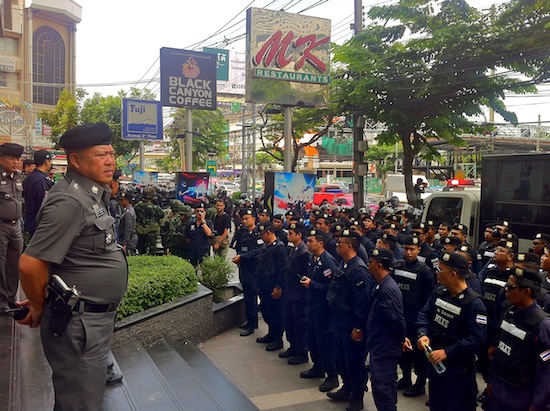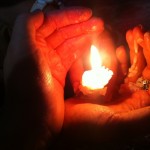Experiences with Curfews, Media Bans, and the Thai Military


I was in the middle of teaching a class when 4:30 p.m. struck on Thursday, May 22. Just moments after the announcement everyone’s phones started buzzing. Students were in and out of the classroom taking phone calls from loved ones and seemed to be completely distracted from the lesson by news updates, texts, and tweets about this anxiously anticipated and drastic decision that will hopefully mend the political conflict that Thailand has been facing for well over seven months.
Politically charged acts of violence have been a common occurrence in Bangkok since October of last year when controversial anti-government protests began demanding that the government step down. This demand included former Prime Minister Yingluck Shinawatra, who was forced to step down earlier this month after a constitutional court found her guilty of abusing her power.
On May 20, about a week after Yingluck’s dismissal from office, the military had declared martial law, insisting that this would not lead to a coup. Just two days later, a coup had become official.
The future of Thailand hangs in the balance, as a mutual understanding about politics couldn’t be made because both sides have shown unrelenting resistance.
When I heard that a coup had officially had been enforced, I imagined the situation in Thailand spiraling uncontrollably into something like Libya, Ukraine, or Egypt.
For now, everyday life has been affected, but not as much as I had imagined it would in the immediate days following. When I heard that a coup had officially had been enforced, I imagined the situation in Thailand spiraling uncontrollably into something like Libya, Ukraine, or Egypt.
It’s not normal here, but I also don’t feel unsafe. For example, my walk home during the night that the coup was announced was oddly different than usual, as I suppose was to be expected. After having to leave work early, due to nationwide enforced 10 p.m. curfew, streets and sidewalks were flooded with people rushing to get home. More often than not, people will sit on a hot bus in traffic for hours rather than walk, so this sight was a bit unnerving and definitely not normal.
Rumors got around that Internet would be cut off at 9 p.m., which it thankfully hasn’t yet and probably won’t be, so people–including myself–were scrambling to prepare. 7-11, the most necessary minimart in the country, had lines weaving throughout the store with people stocking up on instant noodles and water. My basket consisted of those with a few other necessities, including some phone credit just in case I was unable to contact my family in Chicago.
I was preparing as if I was going into a war zone, but looking back it wasn’t technically crucial. But, I’m glad I was “prepared.”
All the while, street side clothes stands and noodle shops were still open for business seemingly trying to make the best of this situation or not caring about the news and carrying on with their lives.
While Thailand has been my home for almost two years, I can never truly understand what this decision means to and for Thais.
Thailand is still under martial law, which among other restrictions, like the curfew and banned international TV news, includes restrictions on where protesters can gather and how many can be there. While it hadn’t seemed to be strictly enforced before, no more than five people can be gathered in public places at one time.
Just two days after the announcement, an anti-coup rally of about 200 people gathered down the block from my apartment in northern Bangkok. As I walked out of my apartment and down the street, I saw a mob of policemen and soldiers holding assault rifles on an overpass walkway. It was a confusing vibe–the soldiers on the overpass were casually chatting with an older woman and her friend, but at the rally site, police and soldiers were lined up and protected by bulletproof vests.
I’ve felt strange and a bit out of place since. I also feel very lucky that I have a home in the U.S. that I can escape to if I have to. While Thailand has been my home for almost two years, I can never truly understand what this decision means to and for Thais.
It’s not normal to see soldiers with automatic weapons on your street corner or outside your local 7-11, that’s for sure, but overall this situation doesn’t make me feel like I’m in imminent danger. It’s the uncertainty of a hopefully peaceful outcome and being a foreigner here during a time like this that makes me uneasy and a bit anxious.
So, as normal, I’ll be a good citizen, stay informed, and smile at the armed men in camouflage.








